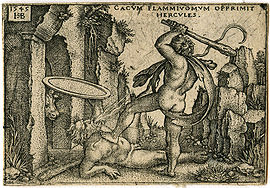
Hercules killing the fire-breathing Cacus, engraving by Sebald Beham (1545).
In Roman mythology, Cacus was a fire-breathing giant and the son of Vulcan. He was killed by Hercules after terrorizing the Palatine Hill before the founding of Rome.[1]
Mythology[]
Cacus lived in a cave in the Palatine Hill in Italy, the future site of Rome. To the horror of nearby inhabitants, Cacus lived on human flesh and would nail the heads of victims to the doors of his cave. He was eventually overcome by Hercules.
According to Evander of Pallene, Hercules stopped to pasture the cattle he had stolen from Geryon near Cacus' lair. As Hercules slept, the monster took a liking to the cattle and slyly stole eight of them - four bulls and four cows - by dragging them by their tails, so as to leave a trail in the wrong direction. When Hercules awoke and made to leave, the remaining herd made plaintive noises towards the cave, and a single cow lowed in reply.
Angered, Hercules stormed towards the cave. A terrified Cacus blocked the entrance with a vast, immoveable boulder, forcing Hercules to tear at the top of the mountain to reach his adversary. Cacus attacked Hercules by spewing fire and smoke, while Hercules responded with tree branches and rocks the size of millstones. Eventually losing patience, Hercules leapt into the cave, aiming for the area where the smoke was heaviest. Hercules grabbed Cacus and strangled the monster, and was praised throughout the land for his act. According to Virgil in Book VIII of the Aeneid, Hercules grasped Cacus so tightly that Cacus' eyes popped out and there was no blood left in his throat: "et angit inhaerens elisos oculos et siccum sanguine guttur."

Hercules and Cacus (Palazzo Vecchio, Florence)
Another version of the myth states that Cacus made the cattle walk backwards so they left a false trail. Hercules drove his remaining cattle past a cave, where Cacus was hiding the stolen ones, and they began calling out to each other. Alternatively, Caca, Cacus' sister, told Heracles where he was.
In the Roman tradition, Hercules founded an altar after he killed Cacus. This was the Ara Maxima, where later the Forum Boarium, the cattle market of Rome, was held. Hercules had temples in the area, including the still extant Temple of Hercules Victor. It is believed that a large stone in the nearby church of Santa Maria in Cosmedin is what is left of the Ara Maxima.
In later literature[]
- In the Inferno poem of the Divine Comedy by Dante Alighieri, Cacus is depicted as a centaur with a fire-breathing dragon on his shoulders and snakes covering his equine back. He guards over the thieves in the Thieves section of Hell's Circle of Fraud.
- Cacus appears as the main antagonist in Rick Riordan's short story The Staff of Hermes.
References[]
- ↑ "CACUS: Giant of the Land of Latium". theoi.com. http://www.theoi.com/Gigante/GiganteKakos.html. Retrieved 24 May 2012.
Further reading[]
| Wikimedia Commons has media related to: Cacus |
- March, J., Cassell's Dictionary Of Classical Mythology, London, 1999. ISBN 0-304-35161-X
- Coarelli, Filippo, Guida Archeologica di Roma, Arnoldo Mondadori Editore, Milano, 1989.
| This page uses content from the English Wikipedia. The original article was at Cacus. The list of authors can be seen in the page history. |